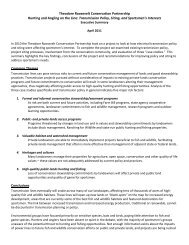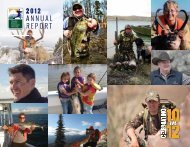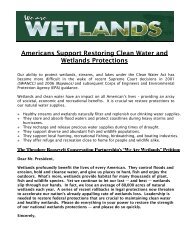RRR_Summer 2008_8.pdf - Theodore Roosevelt Conservation ...
RRR_Summer 2008_8.pdf - Theodore Roosevelt Conservation ...
RRR_Summer 2008_8.pdf - Theodore Roosevelt Conservation ...
You also want an ePaper? Increase the reach of your titles
YUMPU automatically turns print PDFs into web optimized ePapers that Google loves.
Washington Watch<br />
By Tom Franklin, TRCP Senior Vice President<br />
Spotlight: TurnerFoundation<br />
An old Capitol Hill saw<br />
says that controversial<br />
legislation doesn’t pass in a<br />
presidential election year. <strong>2008</strong><br />
is an exception, at least for one<br />
key bill, but others likely will<br />
await action from a new Congress<br />
and president.<br />
One of the more contentious<br />
farm bills in memory limped to<br />
passage under a “Groundhog Day” scenario in which controversy<br />
over funding and a paperwork error caused the legislation to be<br />
passed twice and vetoed twice. When the last veto was finally<br />
overridden, a collective sigh of relief was heard throughout the<br />
D.C. conservation community.<br />
The good news is that the “Food, <strong>Conservation</strong> and Energy Act<br />
of <strong>2008</strong>” extends many successful farm conservation programs,<br />
albeit at somewhat lower funding levels. One huge victory was<br />
the addition of “Open Fields,” a TRCP signature proposal. It<br />
provides $50 million to landowners who offer hunting access<br />
through state programs. The <strong>Conservation</strong> Reserve Program<br />
(CRP), the most effective private lands conservation program<br />
for wildlife in history, will continue at a reduced level. The<br />
Wetlands Reserve Program, Grasslands Reserve Program and<br />
Wildlife Habitat Incentives Program all were extended for four<br />
more years. Tax incentives for conservation easements will<br />
continue for two more years. A major disappointment was the<br />
weakening of the Sodsaver provision that would protect rare native<br />
prairie by removing federal incentives to plow them.<br />
Now that this year’s farm bill is on the books, the attention of the<br />
TRCP has shifted to implementing the authorized conservation<br />
practices. The TRCP and its partners sprung into action when<br />
CRP came under attack in July. Fortunately, the U.S. Department<br />
of Agriculture decided against allowing land owners to<br />
break their CRP contracts without having to pay their CRP<br />
money back. Had the decision gone the other way, it would have<br />
destroyed the gains to fish and wildlife habitat paid for by U.S.<br />
taxpayer dollars through CRP. While this debacle was averted,<br />
there will be more challenges to come.<br />
4<br />
Looming on the horizon is the pressing need to work with the<br />
new president and Congress on key issues. As we do, there is no<br />
doubt that pressures on our fish and wildlife resources will continue<br />
to intensify as our nation’s leaders strive to meet the needs<br />
and desires of a growing population. Our ongoing challenge at<br />
the TRCP will be to garner the resources necessary to guarantee<br />
that the needs of wildlife, hunters and anglers are included in the<br />
national policy as the new president and Congress engage in the<br />
2009 conservation debate.<br />
T.R.ivia<br />
<strong>Theodore</strong> <strong>Roosevelt</strong> lived in the brownstone where he<br />
was born until he was 14 years old. In 1916, the<br />
house was torn down to make room for a commercial<br />
building. After T.R.’s death in 1919, a group of<br />
citizens raised money to purchase the site, tear down<br />
the commercial building and rebuild the <strong>Roosevelt</strong><br />
brownstone as a memorial to our 26th president.<br />
<br />
NAME: KATIE ECKMAN<br />
LOCATION: ATLANTA, GA<br />
OCCUPATION: EXECUTIVE DIRECTOR,<br />
TURNER FOUNDATION<br />
Could you tell us a bit about the Turner Foundation<br />
The Turner Foundation is a private family foundation started by<br />
Ted Turner in 1990. The foundation is overseen by Mr. Turner<br />
and his five adult children. Our mission is to prevent damage<br />
to the natural systems - air, water and land - on which all life<br />
depends. Among other things, the Turner Foundation is currently<br />
supporting efforts to protect wildlife and wild places, mitigate<br />
climate change and ensure clean air and water.<br />
How did you become involved with the TRCP<br />
The Turner Foundation was involved in early discussions<br />
regarding the need for a coordinated effort to better engage and<br />
activate hunters and anglers in natural resource decision making.<br />
In partnership with the Pew Charitable Trusts, we committed<br />
significant funding up-front to meet this need with a new organization<br />
called the <strong>Theodore</strong> <strong>Roosevelt</strong> <strong>Conservation</strong> Partnership.<br />
I presented this opportunity to our board, and they were excited to<br />
get involved.<br />
Why are you involved with the TRCP<br />
Many members of the Turner family are committed sportsmen and<br />
-women with an appreciation for conservation. Their “land ethic”<br />
was ingrained at an early age. They recognize the incredible legacy<br />
of environmental protection spearheaded by hunters and anglers<br />
and the significant opportunity to affect change if this constituency’s<br />
passion can be turned into action. Our grant to the TRCP is<br />
the keystone of our support to conservation organizations.<br />
5<br />
Do you enjoy outdoor pursuits If so, what in particular<br />
I do. I really love fly fishing. My mom got me interested in the sport<br />
several years ago, and I am thrilled to see more and more women<br />
taking it up. I helped start a group of female fly fishing funder colleagues,<br />
which I have gotten a kick out of. I also enjoy bird hunting.<br />
What do you think are our most pressing conservation<br />
issues today<br />
Climate change. While some continue to debate whether climate<br />
change is real and question the severity of potential impacts, sportsmen<br />
cannot stick their heads in the sand. From changes in migration<br />
patterns and forage availability to increased water temperatures,<br />
sportsmen are likely to see and feel the impacts first from our<br />
duck blinds, our tree stands or our favorite trout stream. We all<br />
need to make a personal commitment to mitigating climate change<br />
– but in addition, I think the voice of sportsmen will be critical as<br />
wildlife and habitat managers wrestle with appropriate adaptation<br />
strategies and the lack of funding for their implementation.<br />
I also feel the disconnect between people and nature is a real threat.<br />
How can we expect people to stand up for the environment if they<br />
have never experienced and developed an appreciation for the<br />
outdoors I just finished reading Richard Louv’s Last Child in the<br />
Woods. As the mother of a two-year-old, Louv’s book hit home<br />
and has made me think more about where our future stewards will<br />
come from if this disconnect continues.<br />
What is your approach to facing conservation challenges<br />
Outlive your opponents.<br />
More realistically, recognizing and valuing the human dimension.<br />
For many, conservation is not a moral imperative. You’ve got to be<br />
a salesman and figure out what is in this for everyone. Make what<br />
you are doing make sense. When the economics are in your favor, use<br />
them.<br />
What hopes do you have for the TRCP<br />
I hope the organization continues outreach to the millions of<br />
“unaffiliated” hunters and anglers in this country. The potential to<br />
engage them is great if we can figure out how to do it. The TRCP’s<br />
partnership with the unions is brilliant. I also hope the TRCP<br />
continues to use many different strategies for having its voice heard<br />
– whether that means filing suit to stop oil and gas drilling in sensitive<br />
habitats, using the press to communicate widely your issues or<br />
working to find consensus within the conservation community and<br />
with our elected officials.





